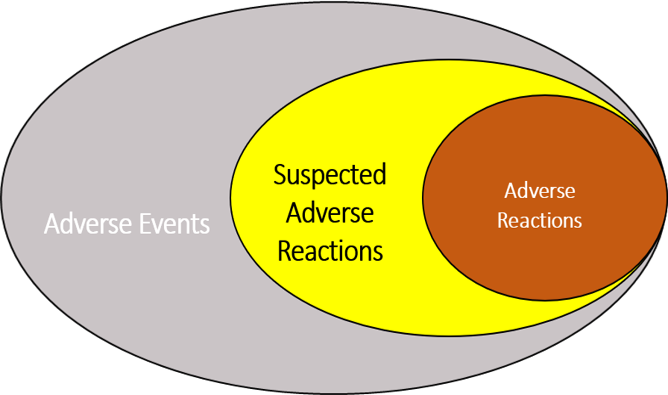Content Status
Type
Linked Node
Adverse Event Definitions and Classifications
Learning ObjectivesAdverse Event Definitions and Classifications
Adverse Drug Reaction (ADR): An unwanted or harmful reaction experienced following the administration of a drug or a combination of drugs, under normal conditions of use, and is suspected to be related to the drug.
Adverse Event (AE): Any unfavourable and unintended sign (including an abnormal laboratory finding), symptom, or disease that presents in a patient during the course of treatment or the procedure, regardless of whether it is considered related to the medical treatment or procedure.
- An AE does not necessarily have a causal relationship with the treatment.
- Suspected ADR and actual ADRs are a subset of AEs, as can be seen in the figure below.

Figure: Relationship between adverse events, suspected adverse reactions and adverse reactions
The table below highlights the difference between an ADR and an AE.
| ADVERSE DRUG REACTION (ADR) | ADVERSE EVENT |
|---|---|
| World Health Organization (WHO) defines an ADR as “Any response to a drug which is noxious, unintended and occurs at doses used in man for prophylaxis, diagnosis or therapy.” i.e it necessarily has a causal relationship. | Any untoward medical occurrence during treatment, which does not necessarily have a causal relationship with this treatment. |
Resources
- Guidelines for Programmatic Management of Drug-resistant Tuberculosis in India, March 2021.
- Ready Reckoner for Medical Officer - Adverse Drug Reactions Associated with Anti-TB Drugs Identification and Management, 2019.
- WHO - A Practical Handbook on the Pharmacovigilance of Medicines Used in the Treatment of Tuberculosis, 2012.
- Technical and Operational Guidelines for TB in India, 2016.
Kindly provide your valuable feedback on the page to the link provided HERE
Content Creator
Reviewer
Target Audience
- Log in to post comments